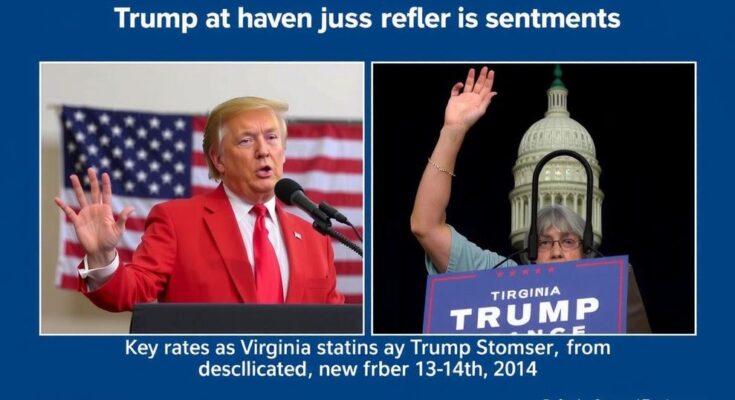Three special elections in Virginia will determine party control of the state Senate and House, assessing voter sentiment post-Trump’s election. Key races feature Democratic and Republican candidates focusing on pivotal issues like abortion rights and economic challenges, with the stakes high for both parties as they seek to influence legislative outcomes.
RICHMOND, Va. — On Tuesday, three special elections will be held in Virginia to fill empty seats in the state Senate and House of Delegates, determining which party controls the chambers. These elections are particularly significant as they offer an early indication of voter sentiments following the recent election of President Donald Trump. Currently, the Senate Democrats maintain a slim 20-18 majority, while the House of Delegates is led by Democrats with a 50-49 edge following the departure of Del. Srinivasan who is running in the Senate race.
In Loudoun County, Republican Tumay Harding competes against Democratic Del. Kannan Srinivasan to succeed Suhas Subramanyam in the Senate. Concurrently, Democrat JJ Singh and Republican Ram Venkatachalam vie for Srinivasan’s vacated seat in the House. Meanwhile, in Goochland County, Republican Luther Cifers faces Democrat Jack Trammell in another state Senate race.
Candidates Srinivasan and Singh are focusing their campaigns on abortion rights, a pressing issue as Virginia Democrats strive to preserve their majority in the Legislature. “What motivates me is the high-stakes election,” Srinivasan remarked, emphasizing the significant implications for legislative control.
Conversely, Harding and Venkatachalam seek to shift power towards Republicans. Harding articulated her concerns regarding issues such as education quality, public safety, and economic challenges facing families. “Our schools are faltering and riddled with politics and division,” she asserted, advocating for a Republican majority to effect change.
Cifers, entering a competitive Senate race, aims to represent conservative interests following a fragmented Republican primary. He articulated a desire to influence legislative discussions, focusing on economic and housing issues. Trammell, a political newcomer seeking to unseat Cifers, aims to present voters with a compelling alternative in a district historically leaning Republican, stating that “to call it a monolithic, traditional-rural Republican district… is a disservice.”
The upcoming elections in Virginia are crucial as they will determine the balance of power in the state legislature during Governor Glenn Youngkin’s final year in office. Following significant Democratic losses in federal elections, the party’s ability to retain control in Virginia is under scrutiny. The political landscape has shifted following the election of Republican Donald Trump, and these special elections are viewed as a barometer for voter sentiment and party performance since that pivotal electoral outcome.
In conclusion, the outcome of the special elections in Virginia will play a decisive role in determining the control of the state legislature, reflecting broader national trends following the recent presidential election. Both parties are mobilizing their candidates around key issues influencing voter priorities, specifically abortion rights and local economic concerns. These elections will serve not only to fill vacant seats but also to gauge public sentiment in a rapidly changing political environment.
Original Source: apnews.com




